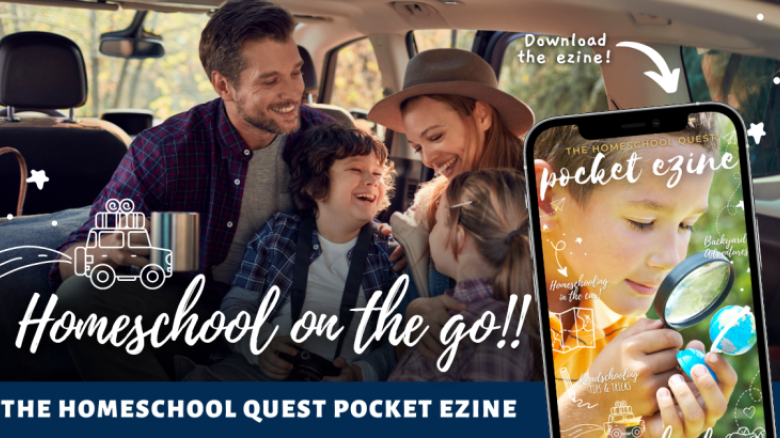By Ashley Wright, Gypsy Gameschooler
My family has been living full-time in our bus and traveling for the past several months. This travel life alone has been so educational for our kids.
Experiencing different parts of the country (and even Mexico!), talking with different people, and eating different local foods has been very good for expanding our world. Then, there are all the other aspects to travel - budgeting, fuel mileage, finding places to dump waste tanks and refill fresh water and propane, places to stay, vehicle maintenance, and, when they’re older, they’ll be learning how to drive our giant 40’ bus.
However, in addition to all this natural learning, we also homeschool our kids and take great delight in helping them further their education. We do this in a variety of ways; through books, websites, documentaries, museums, and more! All this can get expensive, and fast, so we have to get creative to do this within our limited budget.
Books
Public libraries are your best friend! Even on the road, we still use libraries. Before we left, I made sure to get library cards for every family member from every library system we could.
Many libraries have reciprocal agreements with each other, so we could get cards with 10 or 12 different library systems. We have used these cards for checking out digital books. I love reading on my phone, and each of our kids has a cheap tablet that they can access Libby and read for free on, thanks to our library cards.
Whenever we’re in one place for more than a couple of weeks, though, we love visiting the local library in person and getting physical books. My kids are much more likely to read a physical book than a digital one, so we try to do this as much as possible. Usually, all that is required is a piece of mail received at the new address. At our last job in Texas, I got a box delivered. The library staff laughed at me when I brought in the whole box, but they accepted it!
Finally, Little Free Libraries can be a great way to exchange a few books for fresh reading material. Little Free Libraries are all over the country, and you can look them up on their app.
We even found one in a small town in South Dakota! You never know when one will be nearby, so keep your eyes out for them and keep an eye on the app, too.
Documentaries
We have a few different streaming services; Netflix, Disney+, PBS Kids (it’s free!), and Amazon Prime. We can access documentaries through each of these services, but our favorite, by far, is Curiosity Stream. Curiosity Stream is all documentaries, and other than free ones, is our cheapest streaming service. They’re now $40/year. However, that’s still less than $5/month.
Libraries also offer many documentaries, sometimes even available for streaming. Don’t forget about your libraries!
My kids enjoy all of our streaming services. I created an extra profile on Netflix for my kids that I populated with educational shows, some favorites of which are: The Magic School Bus, Carmen Sandiego, Octonauts, Emily’s Wonder Lab, and Waffles + Mochi.
Wild Kratts and Odd Squad are favorites of my kids on PBS Kids. There are lots of other great shows, including SciGirls, Molly of Denali, and WordGirl.
Amazon Prime also has Dino Dan and Dino Dana, Odd Squad, The Amazing Human Body (PBS), and Horrible Histories.
Museums and Zoos
One of my favorite parts about traveling with our kids is that there are always new museums for us to visit! We love getting to visit different museums, but can’t afford admission. So, what do we do? Memberships with reciprocal benefits!
Starting as young as age 8, you can sign your kid up for a free Young Eagles Flight with EAA (Experimental Aircraft Association). This qualifies them for a free student membership to EAA, which comes with ASTC (Association of Science-Technology Centers) reciprocal benefits. So far, we’ve been able to use my son’s free membership to get into a variety of science museums across the country, and haven’t encountered any that have refused us. Since we’re big science nerds, this is one of our favorite memberships!
You can join a zoo that has AZA (Association of Zoos and Aquariums) reciprocal benefits. Just make sure it’s a zoo that will get you into other zoos for free, as many only get you in half-off. We joined the Red River Zoo in North Dakota.
With every reciprocal benefit I’ve encountered (there are also reciprocal benefits for art and history museums, children’s museums, and more), you have to be at least 90 miles away from both your home address and your home museum/zoo address (where you bought the membership). This makes the reciprocal benefits less helpful to someone who stays close to home, but for travelers like my family, it’s no big deal because we’re usually 90 miles away from both.
Also, be sure to check your library. The two library systems closest to our old house both offered museum passes for patrons to check out. Signing up could get rather cutthroat for the more popular museums, but it’s hard to beat free admission!
The Smithsonian Magazine’s Museum Day is another great opportunity to visit a museum for free. Every fall, hundreds of museums across the nation participate. All you have to do is signup in advance, and each email can get up to 2 people in for free. In the past, we’ve used our Museum Day tickets to visit museums we weren’t sure about, or that were outside our norm. (Hint: if you have a big family, get your kids their own email addresses!)
More Homeschooling Resources
Even living tiny, our kids have a lot of open-ended toys. From LEGO and dolls to Snap Circuits and Erector sets, we love having a variety of options for our kids to explore. However, these sorts of toys can get very expensive! How do we afford them?
My favorite way is through our local Buy Nothing group. Whenever we are in an area for more than a few weeks, we try to join. Not all are very active, but when they are, they can be a great resource.
My next-favorite location to get fresh games, science kits, and open-ended toys is the thrift store. I have found really good games for just a couple of dollars, and probably at least half of our game collection has been acquired from a thrift store. You can find books there, too! Even homeschooling curricula. When you have a chance, make sure you check out a few thrift stores, because you never know what treasures you’ll find.
Other homeschoolers are often eager to sell or even give away curriculum, books, toys, clothes, games, and so much more. It’s worth it to join a local group, so you can start building these relationships that can make your homeschooling journey so much more enjoyable.
Homeschooling certainly can be expensive, but it doesn’t have to be. Use these tips to help you afford to craft the wonderful, integrated education you want your kids to have!
By Ashley Wright from Gypsy Gameschooler
Read More!
- Log in to post comments

